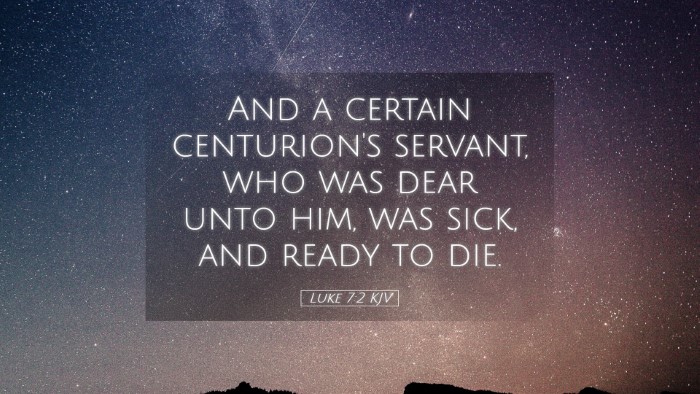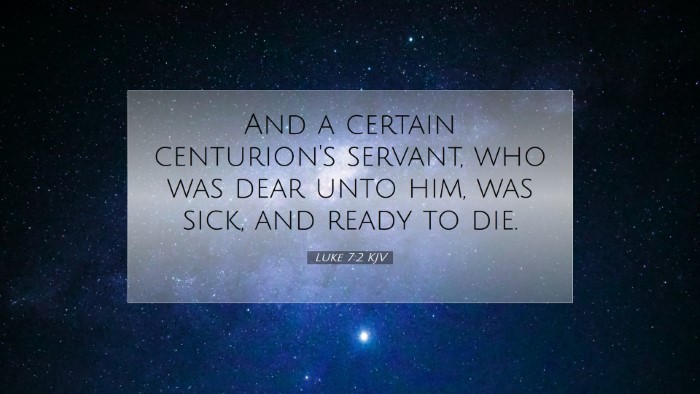Commentary on Luke 7:2
Luke 7:2 states: "And a certain centurion's servant, who was dear unto him, was sick, and ready to die."
This verse succinctly introduces a narrative that reveals the compassion and authority of Jesus contrasted with the faith of a Roman centurion. This account is rich with theological implications and offers a window into the social and cultural dynamics of the time.
Overview of the Centurion
The mention of a centurion is significant for several reasons. Centurions were Roman officers who commanded a hundred soldiers; they were often seen as symbols of the oppressive Roman regime but were nevertheless respected and revered within their communities for their leadership and responsibility.
Matthew Henry's Commentary provides insight into the nature of this centurion, emphasizing that he was a man of high rank who demonstrated great concern for his servant. Henry notes that this indicates a notable character trait: the centurion regarded his servant not merely as property but as someone dear to him, illustrating a depth of empathy that transcended typical social hierarchies.
Albert Barnes adds that this relationship was remarkable, considering the context of a master-servant relationship in Roman culture. His affection for his servant highlights an exceptional kindness and is indicative of the broader virtues that can be found even among those not traditionally seen as 'religious'.
The Servant's Condition
The servant’s dire state—being "sick, and ready to die"—introduces an element of urgency into the narrative. This situation serves to illustrate not only the power of distress but also the heartfelt concern of the centurion.
Adam Clarke notes that the phrase "ready to die" connotes a critical condition, intensifying the scenario's gravity. The centurion’s need for intervention is acute, and it demonstrates a profound dependence on others for healing and help.
Theological Implications
This verse sets the stage for a powerful display of faith and healing. The servanthood relationship points to themes of authority and submission, which can be paralleled to the relationship believers have with Christ.
Matthew Henry observes that the centurion's faith later manifests in an understanding of authority, as he believes Jesus can heal from a distance. This recognition serves not only as a commentary on faith but also reflects the nature of Christ’s power—a power that transcends physical boundaries.
In this centurion's actions, Albert Barnes sees an embodiment of humility. The centurion, despite his high social status and authority, approaches Jesus with a request for mercy rather than demands, illustrating the biblical principle that true authority is often accompanied by humility.
Cultural Context and Application
Understanding the cultural backdrop is essential for grasping the fullness of this passage. Centurions were typically viewed with suspicion by the Jewish populace; however, this particular centurion gained their favor. His actions suggest a shift in how authority figures can engage with marginalized groups.
Adam Clarke emphasizes the implications for contemporary readers: the centurion serves as a model for believers who wish to influence their own communities positively. His approach to Jesus invites reflection on the nature of leadership—are we leveraging our authority towards the compassion of others?
Conclusion
Luke 7:2 introduces a tender yet urgent scenario that lays the groundwork for profound displays of faith and divine healing. Commentaries from Matthew Henry, Albert Barnes, and Adam Clarke not only elucidate the meaning of this text but provide guiding principles for application in pastoral care, community engagement, and personal faith journeys.
- Recognize the value of each individual in your sphere of influence.
- Exercise authority with humility and compassion.
- In times of distress, reach out to Christ with faith for healing.
As we reflect on this passage, may we learn to embody the centurion's faith and commitment to caring for those whom we serve.


